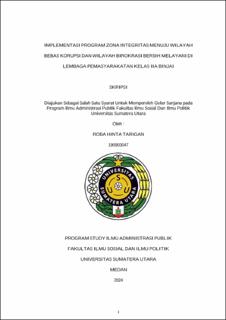| dc.description.abstract | The City of Binjai has launched the Development of an Integrity Zone towards a Corruption Free Area (WBK) and a Clean Serving Bureaucratic Area (WBBM) at the Binjai City BNN Office since 2020, the signing of the integrity pact by the mayor of Binjai City is proof of the commitment of the leaders and government officials as implementers of Bureaucratic reform in the context of government administration is oriented towards serving the community quickly, precisely and professionally, however extortion in Binjai Prison continues and services are not optimal.
This research uses descriptive research methods with a qualitative approach. Data collection techniques were carried out by means of interviews, observation and documentation at the Binjai Class IIA Correctional Institution. The data obtained was then analyzed qualitatively by reviewing all the data collected, which was supported by the results of interviews. The aim of this paper is to see how the implementation of the Integrity Zone Program is towards a Corruption- Free Area and a Clean Bureaucratic Area Serving in the Binjai Class IIA Correctional Institution, with the theoretical approach put forward by Van Matar and Van Horn that program implementation can be measured through six indicators
1. HR, 2 Characteristics of the Implementor's Organization, 3. Communication, 4. Implementor's Attitude, 5. Social, Economic and 6. Political Influence as well as Program Standards and Targets.
Through this research, it can be seen that the implementation of the Integrity Zone Program Towards a Corruption-Free Area and a Clean Bureaucracy Serving Area at the Binjai Class IIA Correctional Institution has been implemented well, but is still in the adjustment stage so there are various difficulties in implementing the program that has been stipulated in the MenPAN-RB Regulations No. 52 of 2014. Training for the integrity zone work team is still lacking, giving rise to different interpretations in implementing and filling out the integrity zone development documents, there are still factors that are beyond the implementor's control, such as gratification from the community. | en_US |





